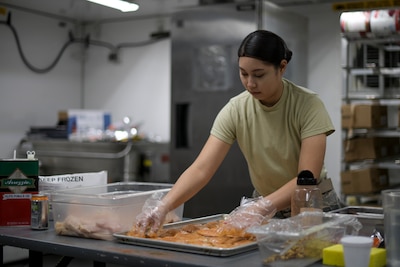By Air Force Staff Sgt. Victor J. Caputo, 24th Special
Operations Wing
HURLBURT FIELD, Fla., March 7, 2018 — Air Force special
operations forces project airpower onto the battlefield. Dozens of different
factors may influence their performance, but there’s one area that can be
easily overlooked: nutrition.
Lindsey Pfau, a dietitian with the 720th Special Tactics
Group, is setting out to make people rethink how special operations airmen
should be fed in a deployed environment.
“We’ve got years of nutritional science to tell us what
foods are good for our bodies from a health perspective and from a performance
perspective,” Pfau said. “This is to push your body to the limit, to be bigger,
faster, and stronger, to stay awake longer, to avoid muscle fatigue, to prevent
cramping, to think more clearly.”
Diet Makes a Difference
She added, “The food you’re eating throughout the day out in
the field is affecting your decision-making, and your precision, speed and
movement as you’re carrying 60 pounds of kit and gear. Your decision
potentially impacts you, your team, your unit and your country.”
Due to high-intensity missions, special operations forces
have unique nutritional needs to meet daily operational demands, Pfau said.
“The idea is to provide these warfighters with food that is
more performance based than traditional field feeding and gives access to
larger portions to provide the calories they need to perform their duties,” she
said. “These guys are easily burning up to 4,000 calories in a day just to do
their job, so we can’t base their nutritional necessities on a generic
2,000-calorie-per-day diet.”
Emerald Warrior is an annual irregular warfare exercise
directed by U.S. Special Operations Command here. This year’s installment,
which started Feb. 22, was the first time that Pfau and Socom’s deployment cell
personnel were able to collaborate on providing an updated, specialized menu to
special operations forces personnel.
The exercise operates out of a simulated deployed forward
operating base with a dining facility running out of a tent, hosting hundreds
of patrons during the three meals offered daily.
More Hot Meals
Pfau worked to increase the number of hot meals available
per day from two to three, provide more fresh vegetables and fruit. Troops
served themselves as opposed to having set portion sizes.
“We need food that is going to be digested well, satisfy
them, give them sustainable energy, and, once their mission is done, will help
with muscle recovery,” she said.
The long-term goal, Pfau said, is to develop the nutrition
plan to benefit all special operations forces.
“We’re starting to evolve the menu planning for all of
Socom, so it’s not just for Special Tactics but also SEAL teams and other
special operations forces,” said Air Force Tech. Sgt. Flint Almiron, a services
craftsman with Socom’s deployment cell. “Right now, we have more fresh-item
selection, more variety and the quality of the food is much better -- it’s not
just MREs.” Military field rations, known as MREs or meals ready to eat, are
the meals often provided to service members in the field.
The realities of being a special tactics operator involve a
lot of hard, physical and cognitive work, Pfau said. The tough work those
airmen go through requires special care, and the nutritional side of recovery
is just as important as physical and mental fitness.
“These jobs place a lot of stress on your joints and your
bones. There’s a lot of inflammation going on. And then, if we’re serving up
high-inflammatory foods throughout their career, it takes a toll,” Pfau said.
“That’s why on our menu, we have lots of anti-inflammatory foods like avocados,
blackberries and blueberries. We’re trying to reduce our saturated fat intake,
we’ve reduced the amount of butter in our recipes, and we’re using
leaner-quality meats and fresh ingredients.”









No comments:
Post a Comment